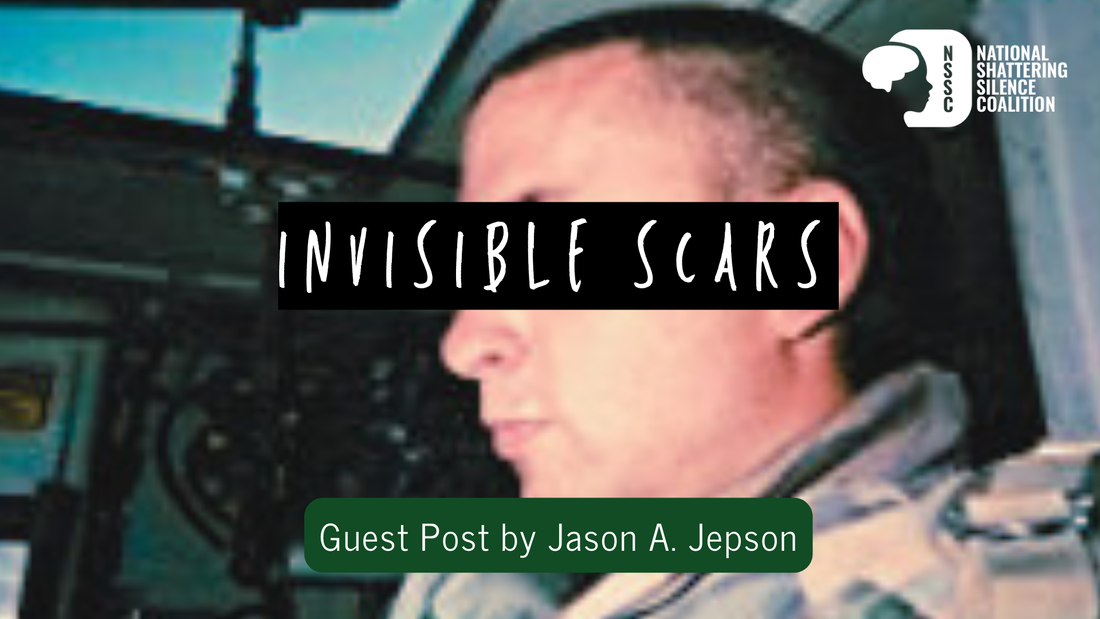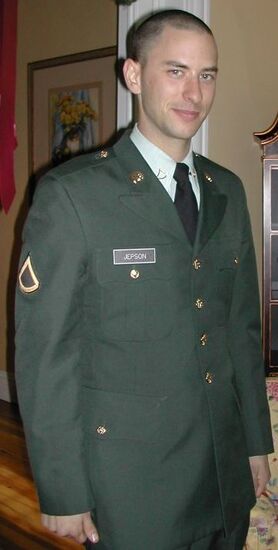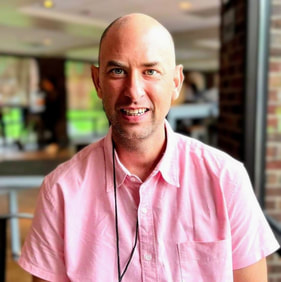|
By Jason A. Jepson, NSSC Member Life has given me scars. Some of them, like the one on the right side of my abdomen, are visible. As an infant, I had pyloric stenosis, a blockage between the stomach and small intestine, which was surgically resolved. As I grew older there would be other accidents leaving more physical scars. There is the scar on my thumb from one of my first jobs working in a restaurant kitchen where I had an unfortunate encounter with a slicing machine. However, the scars that have had the most impact on my life are not ones that left marks on my skin, but the ones invisible to the eye. These scars have left a lasting effect on my life in ways that go far beyond what my visible scars can tell anyone. In 2003, when I entered the United States Army, I took my visible scars with me to Fort Knox, Kentucky. I took a break from college when I joined the Army, and the idea of a military experience seemed like a good fit for me. After basic and advanced training, I was assigned to my first duty station at Fort Irwin, California as a 19 Delta Cavalry Scout. Although physically I had met all of the requirements to become a soldier, I was woefully unprepared for the emotional scar that would wound me in a way that I never expected while in the desert. That wound was the result of a hazing incident that occurred when a few of my fellow soldiers tried to break my spirit by duct taping me into a fetal position. The desperation I felt during that incident broke something loose inside of me and left a mark on my soul that would change my life forever. I have since learned that mental illness can lurk underneath the surface waiting to push its ugly head out. Although serious mental illnesses have biological underpinnings and can happen to people who never experienced trauma, I started to become suspicious of my fellow soldiers. I was paranoid and fearful of everyone around me. I thought people were stealing from me, talking about me in negative ways, and making fun of me. I isolated myself from others. One particular delusion—a false belief I developed—was that I had a special power that would benefit the Army. I thought God was going to use me to teach soldiers to be self-aware, so I referred myself to the mental health clinic on post. No one in the clinic was impressed with my special powers, and instead I was referred to the hospital for psychological testing and received a diagnosis of schizoaffective disorder. This is a serious mental illness/brain disorder characterized by symptoms of schizophrenia, such as hallucinations or delusions, and symptoms of a mood disorder, such as mania and depression. I would go on to learn that my brain disorder would leave an internal scar that would remain with me forever; that I would need to take medication for the rest of my life. I was an inexperienced twenty-three year-old, facing the greatest obstacle of my life, something I felt totally unequipped to handle. Thankfully, I received an honorable discharge from the Army with a 100% disability rating. When I returned home to Virginia, I wasn't the person who I originally was when I had left. I refused to accept my diagnosis and without the medication that I was supposed to be taking, I began acting out in ways that were extremely detrimental to my health and well-being. I didn’t understand my voices and delusions. I grew angry that my parents didn’t understand what was going on with me. In my chaotic rants, I tried to make them accept that I could fight this on my own without medication. Although they did their best to support me by researching my diagnosis and by attending a group for parents of mentally ill loved ones, I believed that they, too, were hearing the voices I was hearing and were part of the conspiracy against me. Having made eye contact with me, my parents were listening to the wrong voices, and I wanted them to only listen to me. I quickly depleted my savings account. I wouldn’t take my medication, and my head was full of voices. My parents finally made the hard decision to call the police because I had become a danger to myself and even to them. It could have ended badly but even I was tired of hearing the voices. It has been several years since I was committed to the psychiatric hospital. Today I am happy to say that I am in recovery, not measured in weeks or months, but in years. During those years I have gone through trial and error with my medications, but with the help of my doctors and with my own patience, I have reached a place where my symptoms are manageable. Along with an antidepressant medication, I now take an injectable antipsychotic monthly, eliminating the need to remember whether I have taken my pills. I still have symptoms, but if they are getting in the way of life, I know I can have a conversation with my doctor about that. Knowing what is going on around me is an important part of my continuing recovery. I have learned to examine the evidence around me to determine whether what I think is happening is part of reality. If there is no evidence, then it is my brain disease talking. The voices are still in my head. Sometimes they are in the form of commentary. Other times they are insulting. One is an ongoing voice in my head of an old man who likes it when I mess up or just waits until I do. Sometimes they are the same voices I heard in the desert or in the evening when the police took me away from my parent's home. Perhaps most importantly, I have accepted that I have a brain disorder that affects my perception of what is going on around me. My ongoing recovery is a sign that healing is taking place. In my recovery, I have chosen to not dwell on the scars, but to live my life the best I can. Part of that purpose is to continue to shed light on mental illness, and to fight the stigma that surrounds mental illness and prevents people from getting the help they need. There is nothing to be ashamed of. Dennis Leary said, “Happiness comes in short doses." I think that means to grab hold of the simple things. That can be a walk around my neighborhood to observe nature, sipping a cup of coffee, or listening to some Miles Davis jazz. Recovery, for me, is about embracing life again. Jason Jepson grew up in Virginia, but he now lives in Myrtle Beach, SC where he advocates for those who have received a diagnosis of severe mental illness. His story of recovery has been published and cited in both online and print publications such as Yahoo News, Psych Central, The Mighty, MSN, and OC87 Recovery Diaries. Jason is happy to share his life experiences in hopes of helping others and removing the stigma that prevents them from getting the help they need.
2 Comments
Barbara Gates
5/2/2024 10:55:55 pm
Thank you for sharing your story of courage and hope.
Reply
6/9/2024 12:34:31 pm
Such an inspiring story. Like myself you had a few very challenging years there but you persarvered. Way to go Jason!
Reply
Leave a Reply. |
Categories
All
|



 RSS Feed
RSS Feed
